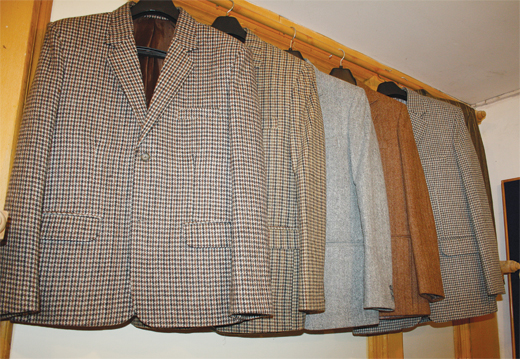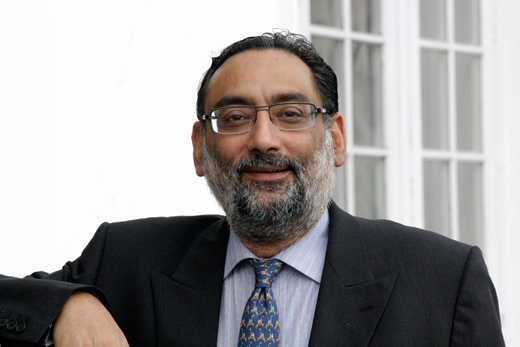Cross LoC cooperation
We at Kashmir Chamber of Commerce and Industry (KCCI) believe that combining a Free Economic Zone and International Financial Centre trans-LoC trade will fetch...
Reid & Taylor strengthens Kashmir Bond
Global fabric giant Reid & Taylor is procuring more tweed from Kashmir and promises to showcase it in a big way. Haroon Mirani reports.
Strengthening...
A new bank is born
Kamraz Rural Bank and Jammu Rural Bank merge to form J&K Grameen Bank. R S Gull reports.
After a three year wait for Union finance...
At the Receiving End
Fayaz Ahmad Ahanger
It seems that Kashmir economy will never achieve the desired and much talked about results if the circumstances continue to be what it looks like.
Trade activities In Kashmir valley, which were once paying high taxes compared to the other parts of the state, are touching the lowest ebb. All the purchases made from outside state got diverted to Jammu province. For this diversion Sales Tax Department played a key role.
Lakhanpur check post continues to play a harassment game especially for valley based traders, for whom the post is out of reach. The unwarranted activities of this post were unbearable to the extent that the Kashmiri traders avoided facing the post and finding an easy option by shifting their total purchases to Jammu province. At that time under sales tax act it suited the Valley traders because of lesser involvement of accounts and sales tax dept. This diversion of trade indeed was an easy option at that point of time but at the same time margins earned were lesser and capital involved was higher due to the tax paid in advance at first point. After the introduction of VAT same trading activities with the Jammu province are turning to be costlier because of complex accounts needs and apathy of Tax Dept.
Wicker: Surviving Chinese Onslaught
Centuries-old wicker industry, which artisans allege has always remained out of government’s sight, is fighting a battle of survival on its own. Haroon Mirani...
Telecom providers fail TRAI survey
Zubair A. Dar
The Telecom Regulatory Authority of India (TRAI) has snubbed telecom service providers in J&K for failing to meet customer satisfaction benchmarks. The regulatory authority has demanded better treatment to customers particularly in resolving their grievances that a state wide survey identified late last year.
The survey, TRAI said, concluded that BSNL, the lone wireline service provider in J&K falls short of TRAI specified benchmark with a score of 58 percent in provision of telephone after registration of demand.
About fault incidence and clearance statistics in wireline service, the report said, “Fault repair remains pain point as only 44 percent of the total complaints registered in the sample exchanges were repaired within 24 hrs which is significantly short of TRAI specified benchmark of 90percent.”
For live calling carried out by IMRB auditors, only 62 percent of subscribers claimed that fault was repaired within 24 hrs. Even for fault repair within 3 days, BSNL falls short of the TRAI specified benchmark with a score of 72 percent.
The Telecom Regulatory Authority of India (TRAI) has snubbed telecom service providers in J&K for failing to meet customer satisfaction benchmarks. The regulatory authority has demanded better treatment to customers particularly in resolving their grievances that a state wide survey identified late last year.
The survey, TRAI said, concluded that BSNL, the lone wireline service provider in J&K falls short of TRAI specified benchmark with a score of 58 percent in provision of telephone after registration of demand.
About fault incidence and clearance statistics in wireline service, the report said, “Fault repair remains pain point as only 44 percent of the total complaints registered in the sample exchanges were repaired within 24 hrs which is significantly short of TRAI specified benchmark of 90percent.”
For live calling carried out by IMRB auditors, only 62 percent of subscribers claimed that fault was repaired within 24 hrs. Even for fault repair within 3 days, BSNL falls short of the TRAI specified benchmark with a score of 72 percent.
Tendering bias
In Kashmir, even the right to submit a tender for government procurement needs an intervention from Chief Minister’s office. R S Gull reports.
The statement that manufacturing sector in Kashmir suffers because of the attitude of the state government for long has remained just an allegation. Rarely has anyone been able to prove it right.
This month, however, the naysayers were vindicated when Chief Minister Omar Abdullah had to personally intervene to allow Khyber Cements, a local cement manufacturing major, submit a tender application. The entrepreneur had been denied the right to apply on ‘flimsy’ grounds by a state government department that makes purchases for hundreds of crores every year.
“We have a huge market in the private sector but that does not mean we can not supply our cement to the state government if and when there is an opportunity,” Umer Khursheed Trambu of Khyber Cements told Kashmir Life. “It was a crude shock that a state government department was seeking tenders from outside manufacturers when better quality cement is produced within the state.”
“Profitability high on lending operations in J&K”
State’s only listed company, the J&K Bank declared a profit of Rs 409.84 crores for 2008-09. This is the highest ever profit that the...
Cost of protest
Strikes have been the most common feature of separatist struggle since 1989. Hamidullah Dar reports the price that people and institutions pay for paralyzing...
Women: Shrinking role
Findings of two censuses, 1981 and 2001, show how women in Kashmir are being limited to home primarily by the thick presence of troops. Hamidullah Dar reports.
Permanent deployment of forces for counter insurgency is not only about occupation of space – agriculture lands, public utilities and orchards, it essentially leads to greater contact with the civilian population resulting in friction that slowly and steadily takes its toll one way or the other. The hitherto unreported impact of this condition is reflected by rise in the number of female non-workers in Kashmir.
By working alongside men in fields and orchards, women have traditionally remained viably active in economic pursuits in Kashmir’s social set up. Besides managing almost half of the burden of activities in agriculture and horticulture sectors, women would collect fire-wood, medicinal plants and other produce from forests to add to the meagre resources at home. But all these activities now stand curtailed due to many factors, chief among them being the thick presence of forces.
Vege-trouble
Vegetable belts of Budgam produce 1,20,000 metric tonnes of vegetables out of which 54,000 metric tonnes are exported. But a host of reasons are...
Revenue generation: Trade suggests how
As Finance Minister Abdul Rahim Rather prepares to draft the budget 2009, he has been interacting with trade and industry chieftains for inputs. Kashmir...
What I want in budget
Sanjay Puri
A joint study by CII with Luthra & Luthra Charted Accountants concluded that Entry Tax impacts the competitiveness of the industry without any corresponding significant benefit to the states’ revenue. It found the tax restricts free flow of trade, mars potential employment generation, increases administrative costs for the industry, and leads to double taxation thus making products expensive for end user.
Perhaps that is why Tamil Nadu and Karnataka had done away with it. In northern region, UP levies entry tax between 1 to 5 percent, Punjab between 2 to 4 percent, Haryana between 2 to 12 percent and J&K levies tax between 4 to 12 percent.
J&K imposes double tax on manufacturing sector - toll tax first on inbound goods and again on outbound goods. One way toll tax will enable the manufacturers to expand their businesses with the neighboring states, thus increasing the quantum of inward goods and leading to higher collection of toll tax. We want this to be reviewed.
A biscuit for health
As entrepreneurship in Kashmir takes roots, a businessmen is in the process of manufacturing biscuits from water chestnuts. Haroon Mirani reports.
A Srinagar based company...
End discrimination to Valley based units
Muhammad Altaf
There are some eighteen registered SSI units manufacturing steel tubular poles in Kashmir Valley. An equal number of such units manufacture steel tubular poles in Jammu. The main purchaser for these poles is the Power Development Department (PDD). The purchase is made through Chief Engineer Procurement & Material Management Jammu which is helped by two purchase circles one headquartered at Jammu and the other at Srinagar. The purchase circle at Srinagar has very little participation and involvement in procuring materials for valley based consuming/utilizing divisions.
There are some eighteen registered SSI units manufacturing steel tubular poles in Kashmir Valley. An equal number of such units manufacture steel tubular poles in Jammu. The main purchaser for these poles is the Power Development Department (PDD). The purchase is made through Chief Engineer Procurement & Material Management Jammu which is helped by two purchase circles one headquartered at Jammu and the other at Srinagar. The purchase circle at Srinagar has very little participation and involvement in procuring materials for valley based consuming/utilizing divisions.













